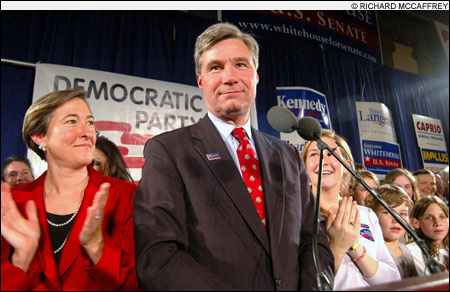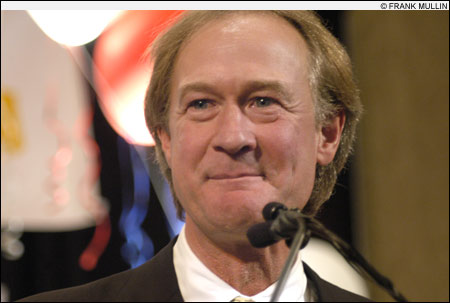For Sheldon Whitehouse, claiming the US Senate seat held by two Chafees over 30 years came down to being the right man in the right place at the right time.

MR. SENATOR: Whitehouse.
|
Although the high-stakes race appeared to tighten in the week or two before Tuesday’s election, Whitehouse clearly maintained the advantage in a campaign season very favorable to Democratic candidates, even with the reservoir of goodwill that attaches to the Chafee name in Rhode Island. “Was I ever concerned? Sure, you’re always concerned,” a beaming Whitehouse told me as he made the media rounds on the 17th floor of the Providence Biltmore after his 53 percent-47 percent victory over Chafee, but he felt a lot of confidence as well.
By relentlessly framing the Senate race as a referendum on the unpopular presidency of George W. Bush, Whitehouse’s campaign effectively scaled back the idiosyncratic personal appeal of Chafee, a very likeable moderate and independent Republican who became a victim of the national GOP’s sharp move to the right.
With the control of the Senate still unresolved as the Phoenix was going to press, Whitehouse, 51, pointed to his victory as a step in the right direction. In assessing his win, the former US attorney and state attorney general, who suffered a sharp personal setback when Myrth York edged him in the 2002 Democratic gubernatorial primary, expressed “a sense of awe and humility that will take me a little while to get used to,” while also asserting he can be “an effective source of new ideas” in the Senate.
Whitehouse’s victory was powered by a 14,000-vote advantage in Providence, a six percent edge in Cranston, and big margins in such reliably Democratic redoubts as Central Falls, Johnston, Pawtucket, North Providence, and Woonsocket. Chafee claimed an eight percent advantage in his home community of Warwick, yet his winning margin in other communities was too narrow to ward off the Democratic tide.
ADVERTISEMENT
 |
While Lieutenant Governor Charles Fogarty fell short in a surprisingly competitive challenge to Republican Governor Donald L. Carcieri, losing by a mere two percentage points, giddy Democrats had reason to be otherwise happy about their broad slate of victories. As US Representative James R. Langevin noted from the Biltmore stage, Democratic efforts in Congress have been “an uphill battle every step of the way with this Republican majority. After tonight, all that changes.”
Indeed, with Democrats across the country reaping the anti-Republican wind, expectations about their ability to deliver will soon mount. US Representative Patrick J. Kennedy, in a guaranteed crowd-pleaser for a Rhode Island audience, noted how one of the first likely acts of the new House session in January will be to elect an Italian-American woman, Nancy Pelosi, as speaker.
Kennedy, who has been in the minority since joining the House in 1994, says the broad Democratic wins offer a chance to show there’s “a lot of serious policy that is behind the politics, and people shouldn’t forget that it isn’t just about festooned rooms.” By way of example, he said Democrats hope to raise the minimum wage and to cut in half interest rates on loans for current college students.
Although polls had consistently predicted the defeat of the proposed Harrah’s Entertainment-Narragansett Indian casino, the 63 percent-37 percent margin against the proposal revealed a surprising amount of opposition, particularly after Harrah’s spent more than $12 million in pushing Question 1.

ON THE OUTS: Chafee.
|
Rhode Island voters otherwise proved to be in a liberal mood, approving a variety of ballot questions, including measures to allow felons to vote after their release from prison, and another earmarking $50 million for the statewide construction of affordable housing.
Elizabeth Roberts, Patrick Lynch, Ralph Mollis, and Frank Caprio, the respective Democratic candidates for lieutenant governor, attorney general, secretary of state, and general treasurer, all won comfortable victories, as did Langevin and Kennedy. The biggest winner of the night, in terms of the margin of victory, was Providence Mayor David N. Cicilline, who attracted 83 percent of the vote against Daniel Harrop, a far lesser-known GOP challenger.
As reporters milled in the Biltmore ballroom early in the evening, exit polls suggested the possibility of a Fogarty upset, powered by labor anger against Carcieri and an aggressive Democratic get-out-the-vote effort. Ultimately, though, Fogarty fell short, continuing — in the lone bright spot for the Rhode Island GOP — the Republican Party’s stranglehold on the governor’s office.
It was hard not to wonder how things might have been different if Fogarty, who seemed not to hit his stride until late in the campaign, had brought an earlier and more aggressive challenge to Carcieri.
Still, Bob Walsh, head of the National Education Association-Rhode
Iland, said the close shave should serve notice of the need for Carcieri to focus more attention on “all the
red meat issues that Charlie Fogarty talked about,” and to extend an olive branch to “a lot of constituencies that the governor hasn’t given the time of day.”
Will the governor pursue a more conciliatory course, or charge full-speed ahead? Stay tuned.